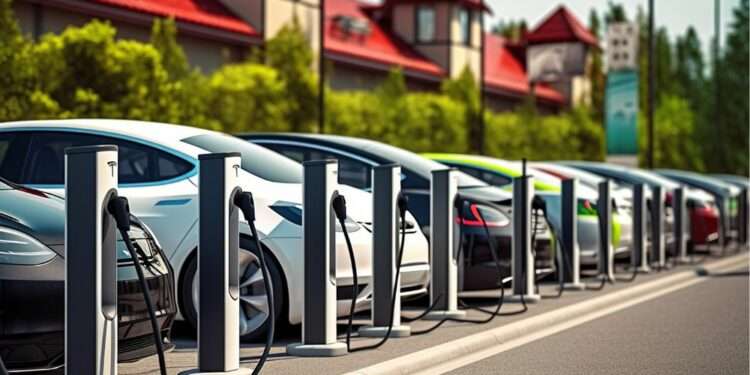The African Continental Free Trade Area (AfCFTA) Secretariat, in collaboration with the World Economic Forum (WEF), recently unveiled a joint report highlighting the transformative potential of the electric vehicle (EV) market for the continent.
As the global EV market is projected to soar to $7.7 trillion by 2025 and an astonishing $46 trillion by 2050, Africa finds itself strategically positioned, boasting 19% of the world’s crucial minerals and metals essential for EV production.
Despite currently holding a modest share in Africa’s automotive production and sales, the rising demand for electric vehicles is becoming increasingly evident.
A pivotal factor contributing to this momentum is the implementation of bans on internal combustion engine vehicles by some of the continent’s major trading partners. These bans are set to take effect as early as 2035, propelling Africa into the forefront of the global EV revolution.
Africa’s vast mineral wealth, including essential elements like cobalt, lithium, and rare earth metals, positions the continent as a key player in the supply chain for EV production. The AfCFTA and WEF report emphasizes that harnessing these resources could lead to a production target of 4-5 million electric vehicles in Africa by 2035.
The electrification of transportation aligns with the broader goals of sustainable development and environmental conservation. By actively participating in the growing EV market, Africa has the opportunity not only to reduce its carbon footprint but also to stimulate economic growth through job creation and technological advancements.
As the world pivots towards sustainable energy solutions, Africa’s commitment to embracing electric vehicles opens doors for innovation, collaboration, and investment. The continent’s leaders recognize the potential economic benefits, not only in meeting domestic demand but also in positioning Africa as a significant player in the global automotive industry.
However, challenges such as infrastructure development, regulatory frameworks, and skill enhancement must be addressed to ensure the successful integration of electric vehicles into Africa’s automotive landscape. The AfCFTA and WEF report emphasizes the importance of collaboration between governments, industries, and international partners to overcome these hurdles and unlock the full potential of the burgeoning EV market.
Accelerating Growth of the Automotive Industry
The report underscores the accelerating growth of the automotive industry in Africa catalyzed by the African Continental Free Trade Area (AfCFTA). The AfCFTA, coupled with global trends, is seen as a catalyst for expanding opportunities, potentially involving more countries in the automotive value chain.
Recognizing this potential, the World Economic Forum is actively collaborating with partners to achieve the ambitious target of manufacturing 4-5 million vehicles by 2035. This initiative also aims to foster the proliferation of manufacturing plants across the continent, reinforcing the commitment to local value addition.
In alignment with the broader trajectory, the report forecasts substantial growth in the African automobile industry, projecting it to surpass $42 billion by 2027. As the continent positions itself to capitalize on the EV surge, Africa’s aspiration to become a key player in global EV production reflects a strategic alignment with both regional and international trends.
The report presents initiatives from the WEF partners to maximize the opportunities of a new free trade area across Africa in the four key sectors of agriculture, transport, automotive and pharmaceuticals.
The African Continental Free Trade Area (AfCFTA) offers the opportunity to unify the small, fragmented markets of 55 separate African states into a single market that, by 2030, would represent 1.7 billion people and $6.7 trillion in consumer and business spending.
If the AfCFTA agreement is fully implemented, it could increase real incomes by 7% or nearly $450 billion. Officially launched in 2021, the AfCFTA could also increase intra-African exports by 81%, providing the opportunity to lift 30 million people from extreme poverty by 2035, according to the World Bank.
By removing barriers to trade, the AfCFTA offers opportunities for the private sector to develop local and regional value chains across the continent. However, the potential benefits to African countries will only be realized if governments eliminate tariff and non-tariff barriers to trade which will incentivize businesses to utilize the agreement.
READ ALSO: Emergency Aid Shipment Enters Gaza Strip





















